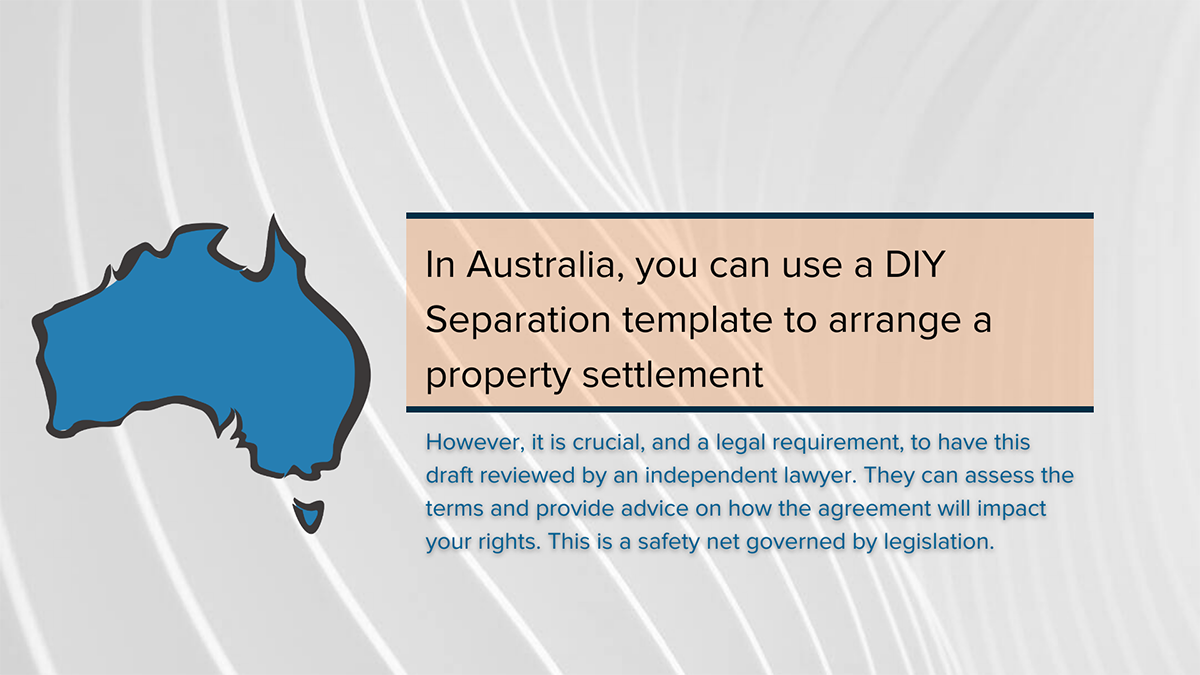The separation process in Australia, fortunately, starts easily. There is no requirement for both parties to agree to a separation, and you are not required to file any paperwork with the court system. The meaning of “separation” in the Family Law Act is simply that the relationship has ended in the eyes of one or more parties. You must inform the other person of your decision and nothing more. You do not need to leave your house to be considered separated.
For more information about legally documenting your separation see our article Using a Separation Agreement Template in Australia to finalise Property Settlement.
How Do the Courts Determine Separation in Australia?
If there is a dispute regarding your situation, especially if you live under one roof, the court will consider several factors in making a decision. You will be required to write and sign an affidavit explaining any of the following:
- Alterations in how you and your spouse sleep or share a bed can indicate a breakdown in the marital relationship. Genuinely separated couples often move to separate bedrooms and sexual activity will cease.
- A decrease in participating in joint activities or outings as a couple or family can demonstrate a decline in the marital bond.
- If there has been a decline in performing day-to-day tasks or household responsibilities for each other, it can suggest a breakdown in the spousal relationship.
- Financial separation, such as maintaining separate bank accounts or managing finances independently, can reflect a breakdown in the financial aspect of the marriage.
- Additional evidence, such as notifying family and friends of the separation or seeking advice from professionals, can further support the claim that the relationship has irretrievably broken down.
You must also explain why you still live under the same roof and if you have informed government departments of your separation.
Informing Government Services of Separation
Centrelink and other government services must be informed of any separation of relationship, even before the divorce has occurred. Informing government services will help you receive any benefits you may need and make any required changes to Medicare. Services Australia also offers extra support in family and domestic violence situations.
What Is Legal Financial Separation?
When you have separated from a partner, one of your next steps should be to arrange the division of property and assets from the relationship. The most cost-effective way to do this during separation is by creating a binding financial agreement between the two parties. You will be required to draft a document that lists all the assets and liabilities of both partners (including the things in your own names), followed by how you will divide them.

What Is Legal Financial Separation?
After separating from your partner, one important step is to address the division of property and assets accumulated during the relationship.
There are two primary options for dividing assets and liabilities in a marriage or de facto separation:
- Court Proceedings: If the parties are unable to reach an agreement through negotiation or mediation, they can initiate court proceedings. This involves applying to the Family Court or Federal Circuit Court for orders regarding the division of property. The court will make decisions based on the individual circumstances and applicable laws, taking into account factors such as contributions, future needs, and fairness.
- Binding Financial Agreement (BFA): Couples can enter into a legally binding contract known as a Binding Financial Agreement, which outlines how they will divide their assets and liabilities without involving the court. This agreement requires both parties to obtain independent legal advice before signing the document to make it binding and enforceable.
Can I use a DIY Separation Agreement?
In Australia, you have the option to use a DIY separation agreement template to create your own BFA. However, it is crucial to have this draft reviewed by an independent lawyer who can assess the terms and provide advice on how the agreement will impact your rights. Each party must seek advice from their own respective lawyers, and the lawyers must provide a “legal practitioner’s statement” as evidence of this advice. This is an essential step in the creation of a binding financial agreement.
You can view our article Navigating Your Separation Agreement Costs: A Guide to Smart Spending for more information on specific costs.

How Is the Process Different When Married v De Facto?
Prior to 2009, de facto relationships were regulated by state legislation, while married couples were governed by the Family Law Act 1975 (Cth) (FLA). However, since the amendment of the Family Law Act to include both de facto and married couples, the law has treated them similarly in terms of separation. Despite the similarities, there are differences when it comes to timeframes for making applications to the family court for spousal maintenance and property division.
In a de facto relationship, you have a window of twenty-four months from the date of separation to initiate court proceedings for property division and spousal maintenance. Failing to file within this two-year period may result in losing the right to make a claim in the future.
For married couples, either party can initiate court proceedings at any time until twelve months after the divorce has been granted. Failure to lodge your claim within the 12 month window may mean you lose the right to make a claim in the future.
It’s worth noting that the parties can make a binding financial agreement at any time, without limit, after separation or divorce.
What Other Steps Should I Take When Separating?
In the early stages of separation, it is easy to be overwhelmed by the tasks you will need to complete. If you are renting and have moved out, you will need to take your name off the lease. You may need to arrange child custody and/or support payments, update insurance policies, and change banking details.
To help you organise, RP Emery provides a free separation checklist to help you through these first days.


